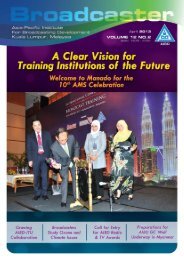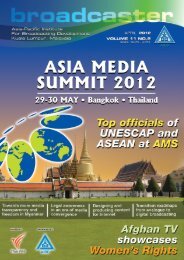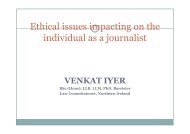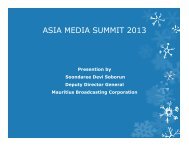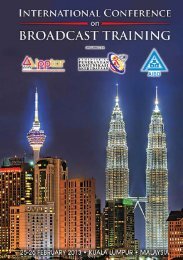SUMMIT
New Visions Asia Media Summit 2008 - AIBD
New Visions Asia Media Summit 2008 - AIBD
- No tags were found...
Create successful ePaper yourself
Turn your PDF publications into a flip-book with our unique Google optimized e-Paper software.
These are the principles we should keep in mind, when discussing the necessary regulatory<br />
framework for new media.<br />
However, we see quite oen that as the impact of new media increases, so do regulaon<br />
techniques that can be used to limit the free flow of informaon. New media are oen<br />
subject to restricons that will not be accepted in tradional media. Violaons of freedom<br />
of expression are growing, and the need to discuss how to prevent undesired side effects<br />
of new regulaon has become urgent.<br />
New ICTs and new media have brought enhanced business compeon and development,<br />
empowerment of individuals and communies to the beer of democracy, increased<br />
diversity and media pluralism. Everyone - and again this is a substanal limitaon in<br />
several parts of the world - with a connecon can start a web-radio or TV, while every<br />
internet user has access to an immense diversity of media, provided there are no filters on<br />
the Internet.<br />
This is in fact a huge challenge - for the good – to the situaon of media concentraon or<br />
oligopolies that we see in many sociees, a situaon which is oen resulng from past<br />
insufficient or outdated regulatory frameworks. This challenge has an impact for<br />
tradional media, which are facing increased compeon, a diluon of the adversing<br />
market, which again is impacng their sustainability, issues around exploitaon and<br />
protecon of copyright and intellectual property rights.<br />
In order to tackle these challenges, several strategies have been aempted, from print<br />
newspapers strengthening their online services, for instance, and thus transforming themselves<br />
also into being “new media-outlets” while at the same me they are transforming<br />
their print pages into in-depth analysis outlets that readers will digest the day aer to<br />
complement the news read online the day before.<br />
There are also massive challenges to public service broadcasters. They are responding in<br />
different ways. Many are very diligently integrang web-services, for instance, on children,<br />
youth, and educaonal programming, as well as they are encouraging and including<br />
user-generated content. Sll, they are facing serious obstacles. For example, the European<br />
Commission is considering regulatory responses to claims from private broadcasters and<br />
new media companies, including from the telecommunicaon industry that public service<br />
broadcast organisaons exercise unfair compeon and thus distort the market. Broadcasters<br />
also meet increasing compeon from audio-visual producon companies, which<br />
are ready to diffuse for free their producons on the web as a promoonal tool.<br />
Eventually the most serious challenge will be coming from the telecommunicaon companies<br />
which are now strongly moving into the field of content producon, parcularly<br />
content distribuon on all mobile and digital plaorms. Recent bales in France between<br />
the large telecommunicaon company Orange and one of the biggest private television<br />
companies, Canal +, show that the public service broadcasters are not alone in finding<br />
good answers to this new challenge.<br />
But there are also challenges to the new media themselves. The new media market today<br />
has very few entry barriers. With lile resources everyone can become a publisher or a<br />
broadcaster - and the real entry barrier is no longer primarily financial resources, but more<br />
so good ideas and the tools and capacity to pursue them. This raises the next issue,<br />
namely, that while new business models for increasing pluralism and diversity of voices<br />
46



